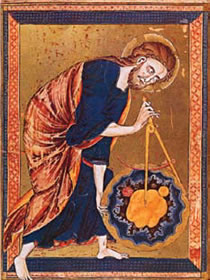26 October 2012
The science and religion debate
 When someone hears the word ‘science’ in close proximity to the word ‘religion’, there is often a quizzical reaction: what does one have to do with the other, except to be in conflict with it?
When someone hears the word ‘science’ in close proximity to the word ‘religion’, there is often a quizzical reaction: what does one have to do with the other, except to be in conflict with it?
There are good reasons for such feelings. One doesn’t have to look very far to find examples of people in either of two opposing camps: those who have made their religion into a ‘science’, and those who have made their science into a ‘religion’. The ‘creationists’ read the Bible for the accurate, detailed scientific information it supposedly contains, while they reject strongly-supported conclusions about the history of nature from astronomy, biology, and geology. The ‘new atheists’ read their atheism into nature, concluding from the absence of God in scientific equations and theories that God therefore does not exist. Ne’er the ’twain shall meet.
The harsh tone emerging from this confrontation is a relatively new phenomenon, and it hides the presence of some deep consonances between science and Christian faith. Above all, as John Polkinghorne has pointed out, science and faith are both searches for motivated belief. Contrary to what Richard Dawkins and others say, religion is not about blind faith in the absence of evidence, any more than science is about ‘truth’ emerging from nature in some simple, unmediated manner. Whether a belief concerns God or nature, it’s not simply what we believe, but why we believe it, that counts. Thus, we believe in thereality of subatomic particles, even though we can’t actually see them with our eyes, because so many physical phenomena are best explained only if they actually exist. Likewise, we believe in the bodily resurrection, because (as NT Wright has shown so effectively) it makes the most sense of all the available evidence.
Ironically, the modern scientific emphasis on rational empiricism - a combination of reason and experience for understanding nature - is partly a product of Christian theological debates that began in the High Middle Ages and continued right through the Scientific Revolution. The issue was the relative roles of reason and will in God’s relationship to the created order: which was actually more important? On the one hand, God created the world rationally, as a product of God’s own reason - which, as creatures made in God’s image, we share to some extent. Thus, our minds ought to be able to comprehend what a rational God must have done; science can be done from an armchair. On the other hand, God created freely, not out of necessity (contrary to Plato’s view that God had no choice), so we must not allow our reason to dictate what God must have done; we must go out and discover things for ourselves. During the Scientific Revolution, when modern science was born, major figures (including Galileo, Descartes, Boyle, and Newton) stated their views on such matters in explicitly theological terms. The conception of scientific knowledge that emerged from that conversation still reflects deeplyembedded theological assumptions, but now they are rarely made explicit - and certainly not acknowledged by Dawkins and company.
Nevertheless, modern scientists sometimes ask theological questions arising from their work, whether or not they mention God. When Albert Einstein said that “the most incomprehensible thing about the world is that it is comprehensible,” he was really asking, why does the world even make sense at all? When Eugene Wigner spoke of “the two miracles of the existence of laws of nature and of the human mind’s capacity to divine them,” he was really asking, why is mathematics such a powerful tool for understanding nature, down deep? And why are we even capable of using it in this way? When Paul Dirac observed that “God used beautiful mathematics in creating the world,” he really wanted to know, why is it that the ‘beautiful’ mathematical equations are precisely the ones we need to understand nature? Science itself has no answer for questions such as these, which are implicitly theological, and the best answer is explicitly so: God is a mathematician, who has “arranged all things by measure and number and weight,” as a Jewish text quite aptly puts it (Wisdom 9:20). It’s no accident that Boyle and so many others have quoted this text, for it sums up so much of the scientific enterprise in so few words.
Edward B Davis is professor of the history of science at Messiah College (Mechanicsburg, PA). Best known for editing (with Michael Hunter) the complete works of Robert Boyle, he has also written numerous articles about religion and science in the US, including a study of modern Jonah stories that was featured on two BBC radio programmes.
- cis.org.uk
- network.asa3.org (American Scientific Affiliation)
- biologos.org/blog/series/science-and-the-bible-five-approaches
You might also be interested in
- 16 Mar 2018 Stephen Hawking and hope for the future
- 09 Feb 2018 Faith in outer space

